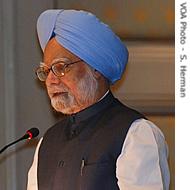VOA标准英语2008年-India Prime Minister Pitches Global Nuclear Dis
搜索关注在线英语听力室公众号:tingroom,领取免费英语资料大礼包。
(单词翻译)
By Steve Herman
New Delhi
09 June 2008
India's prime minister wants his country to be at the forefront of the effort to achieve global nuclear disarmament. The push comes at a time Prime Minister Manmohan Singh's government is trying to seal a civil nuclear fuel agreement with the United States. VOA Correspondent Steve Herman reports from New Delhi.
 |
| Indian Prime Minister Manmohan Singh speaks at a international nuclear disarmament conference, 09 Jun 2008 |
Indian Prime Minister Manmohan Singh has opened an international nuclear disarmament conference by calling for the countries of the world to create a "timebound framework" to rid the world of atomic weapons.
India is among the world's eight declared states having nuclear arsenals1. Speaking to the conference in New Delhi, Monday, Prime Minister Singh called for a comprehensive international pact2 to rid the world of nuclear arms.
"The only effective form of nuclear disarmament and elimination3 of nuclear weapons is global disarmament," he said. "Nuclear weapons know no boundaries."
This year, India submitted a six-step plan for nuclear disarmament to the United Nations General Assembly.
India has been unwilling4 to sign similar treaties, arguing they are unfair because a few countries would be allowed to retain their nuclear weapons indefinitely.
India detonated its first nuclear device in 1974 and conducted five more tests in May, 1998. Its long-time rival, neighbor Pakistan, also has nuclear weapons.
The renewed de-nuclearization campaign by India comes 20 years after then-Prime Minister Rajiv Gandhi, speaking to a U.N. special session, called for the elimination of all nuclear weapons. The appeal received little attention.
Despite the renewed nuclear weapons disarmament call, Prime Minister Singh is emphasizing India will need to increase its nuclear power generation capacity. The country's booming economy is hampered5 by a serious shortfall in electrical generation.
Mr. Singh's government is attempting to win support from its leftist allies for a landmark6 civil nuclear agreement with the United States. The deal would end India's isolation7 in the world nuclear fuel market, imposed because of its nuclear weapons development outside of international frameworks.
In exchange for separating its civil and military nuclear programs, India would be able to buy critically-needed uranium and nuclear technology from the Nuclear Suppliers Group. The 45-country organization controls international trade in such materials, in an attempt to reduce nuclear proliferation.
 收听单词发音
收听单词发音 




